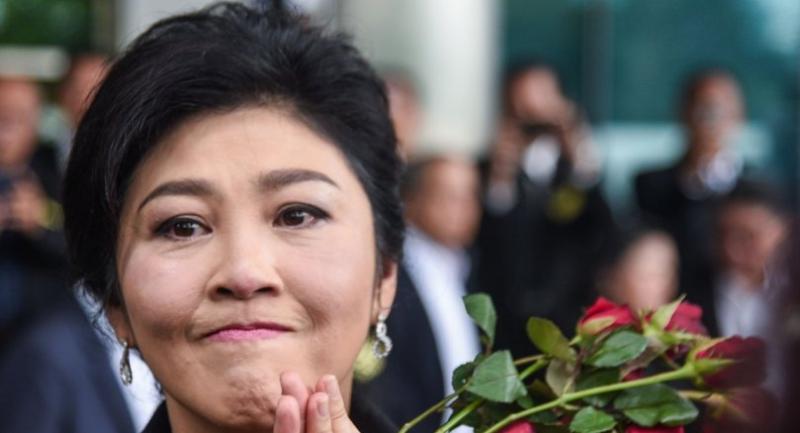Ex-PM challenges top court

As judgement day nears, Yingluck files fresh plea seeking a ruling from Constitutional Court in rice-pledging scandal.
FORMER PRIME MINISTER Yingluck Shinawatra has again requested the Supreme Court to seek a Constitutional Court ruling on a legal issue involving the case against her of negligence in the management of the rice pledging case, challenging the highest court’s decision to reject her previous petition.
In her latest petition, Yingluck said it was beyond the Supreme Court’s legal authority to reject her request and pointed out that such an act was against the new Constitution, which came into effect in early April.
The Supreme Court last week rejected Yingluck’s request that it seek a Constitutional Court interpretation under the new Constitution of a clause that could affect her case.
The negligence case against the former premier stemmed from her government’s corruption-plagued rice-pledging scheme.
In turning down Yingluck’s request, the court had said that both the prosecution and the defence had been given sufficient opportunities to bring witnesses during the months of hearings that ended last Friday.
In her previous petition, Yingluck had pointed out that Article 235 of the new charter requires the Supreme Court to base its consideration upon the inquiry file of the National Anti-Corruption Commission (NACC).
She said this contradicted the 1999 law on the court’s procedures, which required the court to mainly rely on the report by the relevant NACC committee.
Yingluck’s lawyers this week filed her request again with the Supreme Court for a Constitutional Court ruling on the matter.
The highest court has accepted the petition for consideration and is expected to make its decision on August 1 when the ex-PM is scheduled to deliver her closing statement on her case.
The Supreme Court has scheduled August 25 to deliver its verdict on the negligence case against Yingluck.
In her latest petition, viewed by critics as a delaying tactic, Yingluck outlined five reasons why her request for a Constitutional Court ruling was valid.
She pointed out that according to Article 5 of the Constitution – the supreme law of the land – provisions of any law, rule or regulation that are contrary to or inconsistent with the charter “shall be unenforceable”.
Also, Yingluck pointed out that the Supreme Court is required under Article 212 of the new charter to forward her request to the Constitutional Court.
The clause states that if any party in a court case objects to a certain provision of law falling under Article 5, and there has been no decision by the Constitutional Court pertaining to the matter, the relevant court shall send its opinion to the Constitutional Court and seek a decision.
“The Supreme Court has no other choice but to seek a decision from the Constitutional Court. Failing to do so would mean failure to follow Article 212 of the Constitution,” Yingluck said in her latest petition.
“The highest court is not empowered by law to reject the defendant’s request. Going by the requirement under Article 212, the court cannot act in another way,” she said.
“The Constitutional Court is the only court empowered by law to accept or reject such a request. No other courts have such power.”
Yingluck’s petition also noted that the Constitutional Court issued new regulations on case procedures in late April to comply with the new charter. The judges who decided to reject her previous petition should better follow the relevant clause in the new Constitution.
“Otherwise, they may end up flouting the legal principle and be found failing to maintain neutrality as a judge,” she said.
It was a difficult decision to make for her to submit another request to the Supreme Court to seek a Constitutional Court ruling on the legal issue.
“I simply would like to appeal for mercy and justice in this case,” she concluded.
A legal expert who asked not to be named said Yingluck could also petition the Constitutional Court directly if she found that her constitutional rights or liberties were violated.
Article 213 of the new charter states, “Any person whose rights or liberties guaranteed by the Constitution are violated, has the right to submit a petition to the Constitutional Court for a decision on whether such an act is contrary to or inconsistent with the Constitution.”
Deputy Prime Minister and Defence Minister Prawit Wongsuwan said he would be in charge of security when the Supreme Court delivers its verdict on the case against Yingluck.
Thousands of the former PM’s supporters are expected to gather at the courthouse on that day. Authorities have warned of possible legal action if people are mobilised.
Prawit said the government has peacekeeping forces all over the country to take care security, but the court could also make additional requests. He said Yingluck’s supporters could come to Bangkok to give her moral support but it would be better for them to do this from their homes.
Arranging people to support her could be considered as politically motivated and this is prohibited and could risk breaching the law, he added.
Democrat Party politician Warong Dechgitvigrom said on Facebook that Yingluck and her Pheu Thai Party were like intensive care patients at the terminal stage.
“They are doing everything they can, even though that may put their supporters in trouble. Their only goal now is how to survive,” he said.
